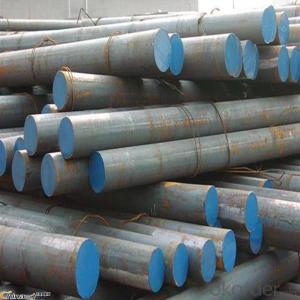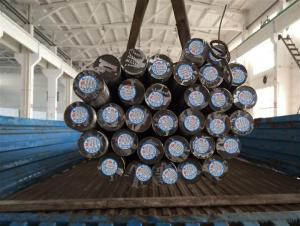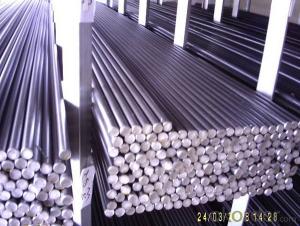AISI 4140 Steel, SAE 4140 Steel Round Bar
- Loading Port:
- China main port
- Payment Terms:
- TT OR LC
- Min Order Qty:
- 30 m.t.
- Supply Capability:
- 10000 m.t./month
OKorder Service Pledge
OKorder Financial Service
You Might Also Like
Item specifice
AISI 4140 Steel, SAE 4140 Steel Round Bar
Product Information:
| Size | ||||||||
| Round bar | Diameter(mm) | Length (mm) | ||||||
| 20~800 | 3000~9000 | |||||||
| Plate | Thickness(mm) | Width (mm) | Length (mm) | |||||
| Max:800 | Max:2200 | Max:9000 | ||||||
| The specification can be customized. | ||||||||
| Chemical Compositons | ||||||||
| Grade | C | Si | Mn | P | S | Cr | Mo | Ni |
| 42CrMo | 0.38~0.45 | 0.17~0.37 | 0.50~0.8 | ≤0.035 | ≤0.035 | 0.9~1.2 | 0.15-0.25 | ≤0.3 |
| 4140 | 0.40~0.45 | 0.15~0.35 | 0.75~1.0 | ≤0.035 | ≤0.040 | 0.8~1.1 | 0.15-0.25 | - |
| SCM44 | 0.38~0.43 | 0.15~0.35 | 0.60~0.9 | ≤0.030 | ≤0.030 | 0.9~1.2 | 0.15-0.30 | ≤0.25 |
| 1.7225 | 0.38~0.45 | ≤0.40 | 0.60~0.9 | ≤0.025 | ≤0.035 | 0.9~1.2 | 0.15-0.30 | |
Features of 4140 alloy steel
1, Chromium molybdenum alloy steel
2, Slightly higher carbon content then 4130
3, Greater strength and heat treatment
Typical Applications
1, Applications in the oil and gas sector
2, Connection rods, collets, conveyor pins,
3, Gears, stem assemblies,
4, Pump shafts and tool holders
Product Overviews:
| Product Name | Typical Grades | Diameter(mm) | Standard adopted |
| Carbon Steel | 20 (1020/S20C/C22) | Ø16-Ø300 | GB/SAE/JIS/DIN |
| 40 (1040/S40C/C40) | |||
| 45 (1045/S45C/C45) | |||
| Bearing Steel | GCr9 (51100/SUJ1) | Ø12-Ø250 | |
| GCr15 (52100/SUJ2/100Gr6) | |||
| GCr9SiMn (A485-Gr.1/SUJ3) | |||
| Cr-Mo Steel | 20Cr (5120/SCr420H/20Cr4) | Ø12-Ø250 | |
| 40Cr (5140/SCr440/41Cr4) | |||
| 42CrMo(4140/SCM440/42CrMo4) | |||
| Gear Steel | 20CrNiMo | Ø16-Ø600 | |
| 20CrMn(5115/SMnC420/20MnCr5) | |||
| 20CrNiMo(8620/SNCM220/20CrMiMo2) |
Product Show:

Our Advantages:
· Industry experience over 20 years.
· Shipment of goods -More than 70 countries worldwide.
· The most convenient transport and prompt delivery.
· Competitive price with best service.
· High technical production line with top quality products.
· High reputation based on best quality products.
With our experienced, enthusiastic and dynamic staffs, we assure to bring you the products with best quality, reasonable prices and good after-sales services under the motto: Friends First, Business After.
Communication, Experience, Expertise and Best efforts are our Promises to you.
- Q:What is the tensile strength of special steel?
- The tensile strength of special steel can vary depending on its specific composition and manufacturing process. However, special steel is generally known for its high tensile strength, often exceeding 1000 MPa (mega pascals), making it suitable for applications requiring strong and durable materials.
- Q:How does aluminum contribute to the properties of special steel?
- Special steel commonly incorporates aluminum as an alloying element to bolster its properties. The addition of aluminum yields multiple enhancements. Firstly, the inclusion of aluminum elevates the strength of the steel by creating a fine dispersion of aluminum nitride particles within the steel matrix. These particles act as barriers that impede dislocation movement, hindering steel deformation and amplifying its strength. Consequently, the steel becomes more resistant to mechanical stresses, thereby augmenting its load-bearing capacity. Secondly, aluminum also boosts the steel's corrosion resistance. It forms a protective oxide layer on the steel's surface, acting as a barrier against corrosive agents. This oxide layer prevents the steel from oxidizing, rusting, and deteriorating over time, thereby rendering it more durable and long-lasting in various environments. Moreover, aluminum can enhance the machinability of special steel. Its presence in the steel composition reduces the steel's tendency to work harden during machining operations. Consequently, cutting, drilling, or shaping the steel becomes easier, resulting in improved productivity and reduced tool wear. Furthermore, aluminum contributes to the heat resistance of special steel. With its high melting point and excellent thermal conductivity, aluminum aids in maintaining the steel's structural integrity at elevated temperatures. This renders aluminum-steel alloys suitable for applications demanding high-temperature resistance, such as those in the aerospace and automotive industries. In conclusion, aluminum plays a significant role in enhancing the properties of special steel. It bolsters strength, corrosion resistance, machinability, and heat resistance, making it a versatile material applicable in various fields.
- Q:How does special steel perform in molding applications?
- Due to its exceptional properties and performance, special steel is highly favored in molding applications. Firstly, its excellent hardness and wear resistance ensure that it remains undamaged and maintains its shape even under high pressure and temperature during the molding process. Additionally, special steel's superb thermal conductivity allows for efficient heat transfer, resulting in uniform heating and cooling of the mold. This leads to consistent and high-quality molded products and reduces cycle times, thus enhancing productivity. Furthermore, special steel's superior corrosion resistance prevents any chemical reactions or rusting, ensuring its durability and longevity even when exposed to moisture or corrosive substances. When it comes to machinability, special steel is easily workable, enabling precise and intricate mold designs. This facilitates the production of detailed molded products with high accuracy and dimensional stability. Lastly, special steel's excellent strength and toughness make it highly resistant to cracking or fracturing under high stress conditions. Consequently, this guarantees the longevity and reliability of the mold, minimizing the need for frequent repairs or replacements. Overall, the exceptional properties of special steel, including hardness, wear resistance, thermal conductivity, corrosion resistance, machinability, and strength, make it an ideal choice for molding applications. It ensures high-quality and consistent molded products, increased productivity, and extended lifespan for the molds.
- Q:What are the different types of coatings for special steel?
- There are various types of coatings available for special steel, including but not limited to, galvanized coatings, powder coatings, epoxy coatings, zinc coatings, and chrome coatings. Each type of coating provides specific benefits such as corrosion resistance, improved aesthetics, enhanced durability, or increased heat resistance, depending on the intended application of the special steel.
- Q:How does special steel contribute to reducing product rejection rates in quality control?
- Special steel contributes to reducing product rejection rates in quality control by providing superior strength, durability, and resistance to wear and tear. These properties enable the production of high-quality components and eliminate common defects such as distortion, cracking, or premature failure. Additionally, special steel's precise composition and manufacturing processes ensure consistency and accuracy in the final products, reducing the likelihood of manufacturing errors and subsequent rejection during quality control inspections.
- Q:How does special steel contribute to the automotive safety?
- Special steel contributes to automotive safety in several ways. Firstly, it is used in the construction of the vehicle's structure, providing strength and rigidity to withstand impacts and collisions. This helps to protect the passengers by minimizing the deformation of the cabin area during a crash. Secondly, special steel is also used in the manufacturing of critical automotive components such as airbags, seat belts, and anti-lock braking systems, which are vital for occupant protection and accident prevention. Additionally, special steel is resistant to corrosion, which ensures the longevity and durability of safety features in a vehicle. Overall, the use of special steel in the automotive industry plays a significant role in enhancing the safety standards of vehicles and protecting the lives of both drivers and passengers.
- Q:How does special steel contribute to sustainability?
- Special steel contributes to sustainability in several ways. Firstly, special steel is highly durable and has a long lifespan. This means that products made from special steel, such as buildings, bridges, and machinery, have a longer service life compared to other materials. This reduces the need for frequent replacements and repairs, thereby reducing the consumption of resources and energy required for manufacturing. Secondly, special steel is recyclable. At the end of its life cycle, it can be easily collected and recycled into new steel products without any loss of quality. This reduces the demand for new raw materials and minimizes the environmental impact caused by mining and extraction processes. Furthermore, special steel is known for its strength and lightweight properties. This allows for the design and construction of lighter and more energy-efficient structures and vehicles. For example, by using special steel in automobiles, the weight of the vehicle can be reduced, resulting in lower fuel consumption and greenhouse gas emissions. Additionally, the production of special steel has become more sustainable over the years. Steel manufacturers are adopting advanced technologies and processes to reduce energy consumption, emissions, and waste generation. This includes using energy-efficient furnaces, recycling waste heat, and implementing water management strategies. Overall, the use of special steel contributes to a more sustainable future by promoting durability, recyclability, energy efficiency, and reduced environmental impact.
- Q:What are the main applications of special steel in the mining transportation?
- Special steel is extensively used in mining transportation for various applications. The main applications include manufacturing durable and high-strength components such as drill bits, conveyor belts, and mining equipment parts. Special steel's exceptional resistance to wear, corrosion, and impact makes it an ideal choice for these demanding environments. Additionally, special steel is used in the construction of infrastructure, such as bridges and railway tracks, ensuring the safe and efficient transportation of mined materials.
- Q:Can special steel be used in the rubber manufacturing industry?
- Yes, special steel can be used in the rubber manufacturing industry. Special steel can be utilized in the production of various rubber processing equipment, such as molds, dies, and machinery parts, due to its high strength, durability, and resistance to wear and tear.
- Q:How does special steel contribute to national security?
- Special steel contributes to national security in several ways. Firstly, it is used in the manufacturing of military equipment and weapons. Special steel possesses high strength, toughness, and resistance to corrosion, making it ideal for producing tanks, armored vehicles, submarines, and aircraft carriers. The use of special steel in military applications ensures the durability and reliability of these crucial defense systems, ultimately enhancing national security. Secondly, special steel is used in the construction of critical infrastructure. It is employed in the fabrication of bridges, tunnels, and buildings that are key to the functioning and security of a nation. Special steel's superior strength and resistance to extreme conditions make it an essential material for structures that need to withstand natural disasters, terrorist attacks, or other security threats. By utilizing special steel in infrastructure projects, a nation can bolster its security and protect its citizens. Furthermore, special steel plays a vital role in the energy sector, particularly in nuclear power plants. Special steel alloys are used in the construction of reactor vessels and other components that are subjected to high temperatures and pressures. The use of special steel ensures the integrity and safety of these critical facilities, preventing potential nuclear accidents that could pose a significant threat to national security. Lastly, special steel contributes to national security by supporting the defense industry and fostering technological advancements. The research and development of special steel alloys often lead to breakthroughs in material engineering, which can have broader applications beyond defense. These advancements can drive innovation in other sectors, such as aerospace, automotive, and energy, thereby enhancing a nation's overall technological capabilities and economic competitiveness. In conclusion, special steel's contribution to national security is multifaceted. Its use in military equipment, critical infrastructure, nuclear power plants, and technological advancements all play a crucial role in safeguarding a nation's interests, protecting its citizens, and maintaining its strategic advantage in an increasingly volatile world.
1. Manufacturer Overview |
|
|---|---|
| Location | |
| Year Established | |
| Annual Output Value | |
| Main Markets | |
| Company Certifications | |
2. Manufacturer Certificates |
|
|---|---|
| a) Certification Name | |
| Range | |
| Reference | |
| Validity Period | |
3. Manufacturer Capability |
|
|---|---|
| a)Trade Capacity | |
| Nearest Port | |
| Export Percentage | |
| No.of Employees in Trade Department | |
| Language Spoken: | |
| b)Factory Information | |
| Factory Size: | |
| No. of Production Lines | |
| Contract Manufacturing | |
| Product Price Range | |
Send your message to us
AISI 4140 Steel, SAE 4140 Steel Round Bar
- Loading Port:
- China main port
- Payment Terms:
- TT OR LC
- Min Order Qty:
- 30 m.t.
- Supply Capability:
- 10000 m.t./month
OKorder Service Pledge
OKorder Financial Service
Similar products
New products
Hot products
Related keywords






























